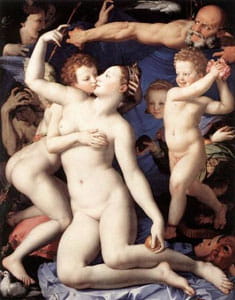 |
| Agnolo Bronzino; Venus, Cupid, Folly and Time (Allegory of Lust) Circa 1545, National Gallery, London |
The usual story of the Sexual Revolution (SR) of the late 1960's is that people threw off the oppressive diktats of the elite (read: Western and especially Christian morality) in order to embrace new freedom. Make love, not war. Free love. And so on. Oh, the joy of sex.
Usually invoked are figures like Freud and Kinsey, who opened up the world of the subconscious and the gap between moral norms and everyday practices. The picture that emerged was of an iceberg: above the water line was the thin veneer of post-Victorian propriety, while submerged beneath was a vast, pulsating world of energy just waiting to be released in joyful play. Point to the reality, the common wisdom went, and one would unleash power to transform the world, rather than be dominated by the few.
Of course at the opposite extreme was a trajectory of thinking rooted in the book of Genesis, that sexual awakening was the consequence of original sin (OS). After Adam and Eve ate the apple, this logic observed, they realized they were naked. And there began enmity between them: the war of the sexes, the consequence of original sin. Moral norms were developed to keep peace and to prevent sexual sin from running amok and destroying people, families, and communities. Sexual morality was about keeping under wraps a potentially destructive force, a Pandora's box. And it is wickedly destructive: convince people that sex is about satisfying a craving, and you have a recipe for the burgeoning sex trade and rampant sexual assault.
The problem with the SR story is that it is rooted in an inadequate understanding of the person. But the OS line of reasoning needs to be fleshed out further.
Here's what I mean. The desire for sex, according to contemporary research, is rooted in the limbic system of the brain, the basic old mammalian programming designed to pass along genes. That out-of-control Pandora's box feeling that people experience is an ancient genetic program that doesn't give a hoot about individuals: it only wants to reproduce itself. Sexual craving is closely related to highs from heroin or cocaine: it overpowers us. It's no surprise, then, that the SR felt like a liberation: it was like moving out of Mom's and Dad's house with all its rules.
But the OS story is limited. Moving out of Mom and Dad's house was at some point inevitable, even if junior used the newfound freedom to get high. The OS account sometimes fails to recall that Mom and Dad had their issues: life was not perfect with the old rules.
Interestingly, the Jewish rabbinic tradition here can be very helpful, with its understanding of good and bad desires. Also helpful are ancient Greek and early Christian notions of spiritual exercise, which as a whole were dedicated to the idea that people could grow by patient learning of how to love the good and eschew the bad. In contemporary terms, that means learning the limited and self-defeating patterns of the limbic system in order to focus on greater goods.
Sexual revolution 2.0 will not look like adolescents escaping from an oppressive home. It must look like grownups asking an altogether different question from "how can I have fun and be free?" That question, I propose, is "what is good for the human family?" For such a question is about first expanding our frame of reference beyond pleasure to love. The one seeking pleasure is likely to fall further and further into selfishness, but the one who loves is willing to take on great challenges for the sake of the good.
What will it mean practically if there is a grown-up version of Sexual Revolution 2.0? First: self knowledge. It will mean coming to see ourselves as we really are, and not measuring ourselves against ridiculous false standards that drive us to absurd conclusions about what our bodies are supposed to look like.





